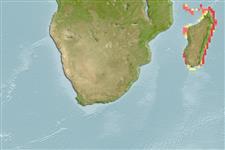Common names from other countries
>
Eupercaria/misc (Various families in series Eupercaria) >
Sciaenidae (Drums or croakers)
Etymology: Argyrosomus: Greek, argyros = silvered, silver + Greek, soma = body (Ref. 45335).
More on author: Lacepède.
Environment: milieu / climate zone / depth range / distribution range
पारिस्थितिकी
समुद्री; स्वच्छ जल, अलवण जल; खारा ड़िमरसल; गहराई सीमा ? - 400 m (Ref. 27121), usually 15 - 150 m (Ref. 27121). Subtropical; 13°C - 24°C (Ref. 3593); 11°N - 27°S, 43°E - 51°E
Indian Ocean: endemic to Madagascar (Ref. 11025). Reports from "Ghana to South Africa" (Ref. 57396) refer to Argyrosomus regius and Argyrosomus coronus (Ref. 11025).
आकार / वज़न / Age
Maturity: Lm ? range ? - ? cm
Max length : 200 cm TL पुल्लिंग / अलिंग; (Ref. 4336); common length : 100.0 cm SL पुल्लिंग / अलिंग; (Ref. 9772); अधिकतम प्रकाशित वज़न: 71.0 kg (Ref. 5369); अधिकतम सूचित उम्र: 30 वर्षो (Ref. 12198)
पृष्ठीय रीढ़ (सम्पूर्ण): 11; पृष्ठीय सौफट रेज़ (सम्पूर्ण): 26-30; गुदा कांटा 2; ऐनल सौफट रेज़: 7. Body silvery; fins grey or brown; upper end of pectoral base with a black blotch (Ref. 4373).
Found in lower reaches of rivers, estuaries, rocky reefs, ocean beaches and on the continental shelf down to 150 m (Ref. 9772). Caught near the bottom and in mid-water. Feed mainly at night or in turbid waters (Ref. 27121), preying on cuttlefish (Ref. 27121), fishes, crabs, prawns, and worms (Ref. 9772).
Life cycle and mating behavior
परिपक्व अवधि | पुनरुत्पत्ति | मछलीऔ का अंडे देना | अंडे | Fecundity | लार्वा
Chao, L.N. and E. Trewavas, 1990. Sciaenidae. p. 813-826. In J.C. Quero, J.C. Hureau, C. Karrer, A. Post and L. Saldanha (eds.) Check-list of the fishes the eastern tropical Atlantic (CLOFETA). JNICT, Lisbon; SEI, Paris; and UNESCO, Paris. Vol. 2. (Ref. 3593)
IUCN Red List Status (Ref. 130435)
CITES (Ref. 128078)
Not Evaluated
Threat to humans
Harmless
Human uses
मात्स्यिकी: व्यापारिक; आखेट मत्स्य: हां
अधिक जानकारी
आम नामउपशब्दचपायचयपरभक्षीईकोटोकसीकोलौजीपुनरुत्पत्तिपरिपक्व अवधिमछलीऔ का अंडे देनाFecundityअंडेEgg development
साधन
Special reports
Download XML
इंटरनेट स्रोत
Estimates based on models
Preferred temperature (Ref.
115969): 21.4 - 27.6, mean 25.9 (based on 60 cells).
Phylogenetic diversity index (Ref.
82804): PD
50 = 0.5020 [Uniqueness, from 0.5 = low to 2.0 = high].
Bayesian length-weight: a=0.00562 (0.00332 - 0.00953), b=3.06 (2.92 - 3.20), in cm Total Length, based on LWR estimates for this species & (Sub)family-body (Ref.
93245).
Trophic level (Ref.
69278): 4.5 ±0.8 se; based on diet studies.
लौटाव (Ref.
120179): बहुत नीचे, न्यूनतम जनसंख्या दुगनी समय अवलागत 14 महीने। (K=0.03; tm=6).
Fishing Vulnerability (Ref.
59153): Very high vulnerability (90 of 100).
Climate Vulnerability (Ref.
125649): Moderate to high vulnerability (53 of 100).
